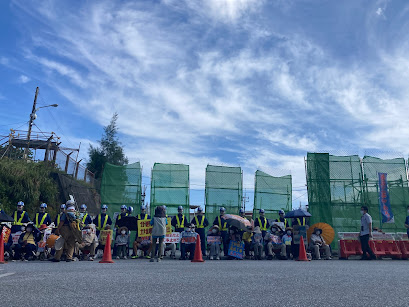(Very belated) Press Release: Yambaru Forest in World Heritage Watch Report 2025
World Heritage Yambaru Forest and the U.S. Military’s Northern Training Area
On June 2, 2025, World Heritage Watch, a Berlin-based NGO dedicated to protecting and conserving UNESCO World Heritage sites, released its World Heritage Watch Report 2025 (WHW Report 2025). Our report, "Lack of Information on Military Training Hinders the Conservation of Northern Okinawa," is included alongside 52 other reports. The authors are Hideki Yoshikawa (Okinawa Environmental Justice Project), Masami Kawamura (The Informed Public Project), Akino Miyagi, and Shin-ichi Hanawa (Protect Henoko and Takae NGO Network).
This marks the fourth time the authors have contributed to the WHW Report since the Yambaru Forest (officially Northern Part of Okinawa Island) was inscribed as a UNESCO World Natural Heritage site in 2021. The WHW Report 2025 has been sent to the UNESCO World Heritage Centre, IUCN, ICOMOS, and ICCROM. Using our report, Hideki Yoshikawa participated in direct communication during the WHW NGO-UNESCO Dialogue in May this year.
Highlights
Our report highlights the following points.
1) We introduce a 2023 Japanese government document acquired by Miyagi Akino via information disclosure procedures: it shows that the issuance of the “Joint Statement” on protecting the World Heritage site Yambaru Forest by the Japanese and US governments in July 2023 was directly influenced by the efforts of UNESCO, IUCN, and civil society. We emphasize the importance of UNESCO and IUCN’s direct engagement with the Japanese government and the U.S. military, urging their continuing efforts in this regard. However, we also note that it is still unclear how the “Joint Statement” is translated into specific actions and whether it is delivering tangible results.
2) We highlight the lack of information regarding how US military training affects the World Heritage site Yambaru Forest, especially concerning endemic and endangered species. We emphasize that the lack of information hinders the conservation of the Yambaru Forest. We also note that due to geopolitical instability in East Asia, military training has intensified, with the Japanese Self-Defense Forces, along with British and Dutch military forces, participating.
Furthermore, we report that civil society organizations sent letters to the British and Dutch militaries requesting information on joint training with the US military and environmental conservation measures taken during such training, and that the British military responded that “no information in scope of your request is held” and that “there were no British Armed Forces involved in any joint training exercises at the US military Northern Training Area in Okinawa, Japan in 2022.” We note that this response from the British military contradicts statements made by the U.S. military during a 2023 press conference, which mentioned that British and Dutch military forces participated in joint training in 2022.
3) We report that the Ministry of the Environment's draft “Yambaru National Park Management and Operation Plan (Public Comment Draft)” (2025) completely omits any mention of military training or U.S. military waste at the Northern Training Area adjacent to the national park, which includes the World Heritage site Yambaru Forest. We emphasize the need for an appropriate survey on the impact of military training on the World Heritage site and request that the Japanese and U.S. governments conduct such a study.
4) We report that Miyagi Akino, who has been protesting against military training and U.S. military waste left in the World Heritage site Yambaru Forest (more precisely, the former northern training area now included in the World Heritage site), was convicted in March 2025 for violations of the Road Traffic Act and the Explosives Control Act. We emphasize that to ensure the Outstanding Universal Value of the Yambaru Forest, local citizens’ participation in seeking information regarding its condition must be encouraged, not hindered or threatened.
Moving forward
In the “Preface” of the WHW Report 2025, it is highlighted that, 80 years after the end of World War II and 79 years after UNESCO's founding, many United Nations systems, including the UNESCO World Heritage Convention, are struggling to fulfill their roles. Therefore, it is emphasized that we need to reaffirm the accomplishments of the United Nations systems so far and work to protect these systems.
We, the authors, will continue to work together with civil society members, the World Heritage Center, and the IUCN, and urge the governments of Japan and the United States to transform the Yambaru Forest into a “true World Natural Heritage Site” free from military influence. We believe such efforts will help safeguard the World Heritage Convention and its mechanisms as well.
Contact:
Hideki Yoshikawa
Director, Okinawa Environmental Justice Project




